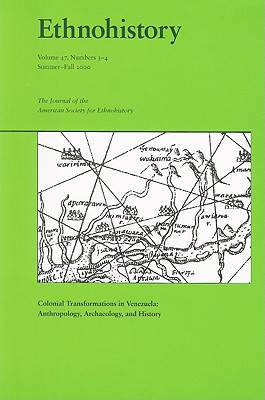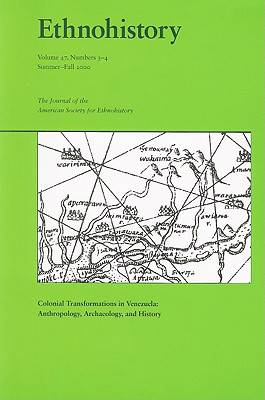
- Afhalen na 1 uur in een winkel met voorraad
- Gratis thuislevering in België vanaf € 30
- Ruim aanbod met 7 miljoen producten
- Afhalen na 1 uur in een winkel met voorraad
- Gratis thuislevering in België vanaf € 30
- Ruim aanbod met 7 miljoen producten
Zoeken
Colonial Transformations in Venezuela
Anthropology, Archaeology, and History Volume 47
Berta E Pérez
€ 30,95
+ 61 punten
Omschrijving
This special issue employs the tools of history, anthropology and ethnology to address the relationship between the colonizer and the colonized in Venezuela. It examines various aspects of the Venezuelan oral-based cultures--including religion, gender, and trade--and argue that the indigenous and black populations were never "cultural islands"--neither before nor after European penetration.
"Colonial Transformations in Venezuela" also provides a much-needed ethnohistorical approach to tropical Amazonia in general. In light of current debates over the nature of the colonial occupation and the ecological potential of the tropical forest as a site for human complexity and development, the papers gathered in this special issue bring new kinds of arguments and important new data to these issues. The articles also indicate important new lines of research for the understanding of native histories in a modern age of global connections.
"Colonial Transformations in Venezuela" also provides a much-needed ethnohistorical approach to tropical Amazonia in general. In light of current debates over the nature of the colonial occupation and the ecological potential of the tropical forest as a site for human complexity and development, the papers gathered in this special issue bring new kinds of arguments and important new data to these issues. The articles also indicate important new lines of research for the understanding of native histories in a modern age of global connections.
Contributors include Rodrigo Navarrete, H. Dieter Heinen. Alvaro Garcia-Castro, Rafael A. Gassón, Silvia M. Vidal, Lilliam Arvelo, Franz Scaramelli, Kay Tarble, and Nelly Arvelo-Jiménez
Specificaties
Betrokkenen
- Auteur(s):
- Uitgeverij:
Inhoud
- Aantal bladzijden:
- 356
- Taal:
- Engels
- Reeks:
- Reeksnummer:
- nr. 47
Eigenschappen
- Productcode (EAN):
- 9780822364962
- Verschijningsdatum:
- 14/08/2000
- Uitvoering:
- Paperback
- Formaat:
- Trade paperback (VS)
- Afmetingen:
- 163 mm x 228 mm
- Gewicht:
- 476 g

Alleen bij Standaard Boekhandel
+ 61 punten op je klantenkaart van Standaard Boekhandel
Beoordelingen
We publiceren alleen reviews die voldoen aan de voorwaarden voor reviews. Bekijk onze voorwaarden voor reviews.











